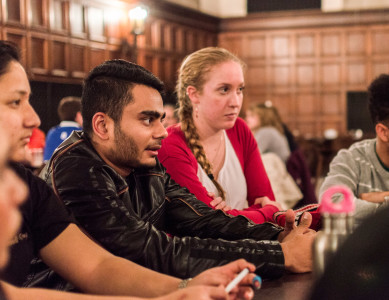
Photo by Jun Taek Lee
The Pioneer Diversity Council held its first dialogue this semester on the athlete-non-athlete divide Thursday night, discussing issues that pertain to most students on campus. The dialogue is a continuation of last semester’s dialogue and deals with mitigating and decreasing the divide between athletes and non-athletes.
“In general, the council serves to bridge the gap between all the different forms of diversity on campus,” said Joe Galaske ’17, a member of the council. Galaske also plays football and track and field for the Pioneers.
This issue is seen as a top priority for the council, as their goals from last semester have remained the same. Beyond the divide, the council also deals with issues prevalent in the athlete community that are pertinent to diversity.
“We’re trying to bring everyone together on campus,” Galaske said.
Held in Main Quad, the event broke attendees down into five separate groups in order to facilitate smaller group discussion. Responding to prompts prepared by members of the council, groups discussed stereotypes of sexual assault, LGBTQ and integration in regards to athletes and non-athletes.
“We’ve been more focused on the athlete non-athlete [divide] and the perceptions and intentions of both sides,” Galaske said. These perceptions were discussed and dissected as attendees from both groups weighed in on their respective opinions.
As the dialogue went on, solutions to the issues presented became a topic of discussion. Improving the Bear experience for non-athletes by keeping the general population informed on team schedules was seen as a possible solution for preventing intimidation in the Bear. Integrating athletes with the non-athlete population socially was also discussed in terms of expanding NSO to make sure athletes are not separated from their fellow students.
Breaking down the reasons for certain stereotypes was seen as a larger problem that goes beyond Grinnell, yet can be improved on campus. All of these issues yielded varying responses from the mixed crowd, but the different perspectives offered a more complete narrative of the Grinnell experience.
“I never previously thought of the athlete-non-athlete divide as being a big deal, it seemed like teams naturally become friends with each other and there’s nothing wrong with that. It was interesting to hear athletes’ opinions. We came up with a lot of suggestions, but I think it is hard to form friendships inorganically through forced school programming,” said Isabella Alsobrook ’16, a non-athlete.
Altogether, it seems that both groups are interested in becoming more cohesive and putting aside differences. While there are issues that will be difficult to resolve, the general sentiment is that there is no need for such a divide, and that both groups are willing to work towards a more united Grinnell.
“Grinnell should be a space where everyone should feel free to collaborate no matter what their differences or background are,” said Thomas Jones ’18, a member of the football team.

















































